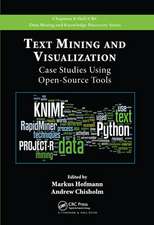Recommender Systems Handbook
Editat de Francesco Ricci, Lior Rokach, Bracha Shapiraen Limba Engleză Paperback – 22 aug 2016
| Toate formatele și edițiile | Preț | Express |
|---|---|---|
| Paperback (2) | 1936.04 lei 43-57 zile | |
| Springer Us – 23 apr 2023 | 1936.04 lei 43-57 zile | |
| Springer Us – 22 aug 2016 | 2218.18 lei 43-57 zile | |
| Hardback (1) | 1668.40 lei 22-36 zile | +66.36 lei 5-11 zile |
| Springer Us – 23 apr 2022 | 1668.40 lei 22-36 zile | +66.36 lei 5-11 zile |
Preț: 2218.18 lei
Preț vechi: 2772.72 lei
-20% Nou
Puncte Express: 3327
Preț estimativ în valută:
424.44€ • 444.35$ • 351.20£
424.44€ • 444.35$ • 351.20£
Carte tipărită la comandă
Livrare economică 07-21 aprilie
Preluare comenzi: 021 569.72.76
Specificații
ISBN-13: 9781489977809
ISBN-10: 1489977805
Pagini: 1003
Ilustrații: XVII, 1003 p.
Dimensiuni: 155 x 235 mm
Greutate: 1.4 kg
Ediția:Softcover reprint of the original 2nd ed. 2015
Editura: Springer Us
Colecția Springer
Locul publicării:New York, NY, United States
ISBN-10: 1489977805
Pagini: 1003
Ilustrații: XVII, 1003 p.
Dimensiuni: 155 x 235 mm
Greutate: 1.4 kg
Ediția:Softcover reprint of the original 2nd ed. 2015
Editura: Springer Us
Colecția Springer
Locul publicării:New York, NY, United States
Cuprins
Recommender Systems: Introduction and Challenges.- A Comprehensive Survey of Neighborhood-based Recommendation Methods.- Advances in Collaborative Filtering.- Semantics-aware Content-based Recommender Systems.- Constraint-based Recommender Systems.- Context-Aware Recommender Systems.- Data Mining Methods for Recommender Systems.- Evaluating Recommender Systems.- Evaluating Recommender Systems with User Experiments.- Explaining Recommendations: Design and Evaluation.- Recommender Systems in Industry: A Netflix Case Study.- Panorama of Recommender Systems to Support Learning.- Music Recommender Systems.- The Anatomy of Mobile Location-Based Recommender Systems.- Social Recommender Systems.- People-to-People Reciprocal Recommenders.- Collaboration, Reputation and Recommender Systems in Social Web Search.- Human Decision Making and Recommender Systems.- Privacy Aspects of Recommender Systems.- Source Factors in Recommender System Credibility Evaluation.- Personality and Recommender Systems.- Group Recommender Systems: Aggregation, Satisfaction and Group Attributes.- Aggregation Functions for Recommender Systems.- Active Learning in Recommender Systems.- Multi-Criteria Recommender Systems.- Novelty and Diversity in Recommender Systems.- Cross-domain Recommender Systems.- Robust Collaborative Recommendation.
Recenzii
“If you have time for just one book to get yourself up to speed with the latest and best in recommender systems, this is the book you want. … this is an excellent educational resource on the main techniques employed for making recommendations … . is definitely a book to read to get updated on the state of the art of recommender systems, and also to get a feel of the breadth of the research areas available in this area.” (Jun-Ping Ng, Computing Reviews, April, 2016)
Notă biografică
Francesco Ricci is a professor of computer science at the Free University of Bozen-Bolzano, Italy. His current research interests include recommender systems, intelligent interfaces, mobile systems, machine learning, case-based reasoning, and the applications of ICT to health and tourism. He has published more than one hundred thirty of academic papers on these topics. He is the editor in chief of the Journal of Information Technology & Tourism and on the editorial board of User Modeling and User Adapted Interaction. Lior Rokach is a data scientist and an associate professor of information systems and software engineering at Ben-Gurion University of the Negev (BGU). Rokach established the machine learning laboratory in BGU which promotes innovative adaptations of machine learning and data mining methods to create the next generation of intelligent systems. Rokach is known for his contributions to the advancement of machine learning, recommender systems and cyber security. Bracha Shapira is an associate professor and the head of the information systems and engineering Department at Ben-Gurion University of the Negev (BGU). She leads large scale research projects at the Telekom Innovation Laboratories at BGU in the area of data analytics, recommender systems and personalization that delivers innovative technologies to address challenges in these fields. Shapira is known for her contribution in integrating social network, context awareness and privacy consideration to recommender systems.
Caracteristici
Includes major updates as well as 20 new chapters
Presents detailed case studies
Shares tips and insights from renowned experts in the field
Presents detailed case studies
Shares tips and insights from renowned experts in the field
Textul de pe ultima copertă
This third edition handbook describes in detail the classical methods as well as extensions and novel approaches that were more recently introduced. It consists of five parts: general recommendation techniques, special recommendation techniques, value and impact of recommender systems, human computer interaction, and applications. The first part presents the most popular and fundamental techniques currently used for building recommender systems, such as collaborative filtering, semantic-based methods, recommender systems based on implicit feedback, neural networks and context-aware methods.
The second part of this handbook introduces more advanced recommendation techniques, such as session-based recommender systems, adversarial machine learning for recommender systems, group recommendation techniques, reciprocal recommenders systems, natural language techniques for recommender systems and cross-domain approaches to recommender systems. The third part covers a wideperspective to the evaluation of recommender systems with papers on methods for evaluating recommender systems, their value and impact, the multi-stakeholder perspective of recommender systems, the analysis of the fairness, novelty and diversity in recommender systems. The fourth part contains a few chapters on the human computer dimension of recommender systems, with research on the role of explanation, the user personality and how to effectively support individual and group decision with recommender systems. The last part focusses on application in several important areas, such as, food, music, fashion and multimedia recommendation.
This informative third edition handbook provides a comprehensive, yet concise and convenient reference source to recommender systems for researchers and advanced-level students focused on computer science and data science. Professionals working in data analytics that are using recommendation and personalization techniques will also find this handbook a useful tool.
The second part of this handbook introduces more advanced recommendation techniques, such as session-based recommender systems, adversarial machine learning for recommender systems, group recommendation techniques, reciprocal recommenders systems, natural language techniques for recommender systems and cross-domain approaches to recommender systems. The third part covers a wideperspective to the evaluation of recommender systems with papers on methods for evaluating recommender systems, their value and impact, the multi-stakeholder perspective of recommender systems, the analysis of the fairness, novelty and diversity in recommender systems. The fourth part contains a few chapters on the human computer dimension of recommender systems, with research on the role of explanation, the user personality and how to effectively support individual and group decision with recommender systems. The last part focusses on application in several important areas, such as, food, music, fashion and multimedia recommendation.
This informative third edition handbook provides a comprehensive, yet concise and convenient reference source to recommender systems for researchers and advanced-level students focused on computer science and data science. Professionals working in data analytics that are using recommendation and personalization techniques will also find this handbook a useful tool.



























